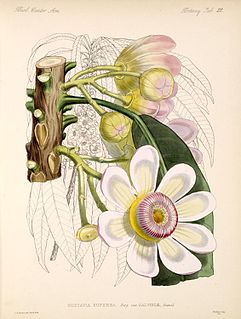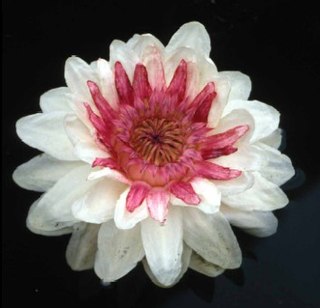
Nepenthes gracillima is a highland Nepenthes pitcher plant species, native to Peninsular Malaysia.

Nepenthes ramispina is a highland Nepenthes pitcher plant species, native to Peninsular Malaysia. It was once regarded as being similar to N. gracillima, but studies of the two species in nature have shown that they are readily distinguishable in isolation, N. gracillima being far more readily confused with N. macfarlanei in its rosette stage.

Nepenthes alba is a tropical pitcher plant endemic to Peninsular Malaysia. The specific epithet alba is derived from the Latin word albus, meaning "white", and refers to the colour of the upper pitchers.
Gustavia dodsonii is a species of woody plant in the family Lecythidaceae. It is found only in Ecuador. Its natural habitats are subtropical or tropical moist lowland forests and subtropical or tropical moist montane forests.
Gustavia erythrocarpa is a species of woody plant in the family Lecythidaceae. It is found only in Brazil. It is threatened by habitat loss.
Gustavia excelsa is a species of woody plant in the family Lecythidaceae. It is found only in Colombia.
Gustavia foliosa is a species of woody plant in the family Lecythidaceae. It is found in Colombia and Ecuador.
Gustavia fosteri, one of several plants in the genus Gustavia known by the Spanish common name membrillo, is a species of woody plant in the family Lecythidaceae. It is found only on Barro Colorado Island in Panama. It is threatened by habitat loss.
Gustavia latifolia is a species of woody plant in the family Lecythidaceae. It is found only in Colombia.
Gustavia longepetiolata is a species of woody plant in the family Lecythidaceae. It is found only in Brazil. It is threatened by habitat loss.
Gustavia longifuniculata is a species of woody plant in the family Lecythidaceae. It is found only in Colombia.
Gustavia monocaulis is a species of woody plant in the family Lecythidaceae. It is found in Colombia and Panama. It is threatened by habitat loss.
Gustavia pubescens is a species of woody plant in the family Lecythidaceae. It is found in Colombia and Ecuador.
Gustavia santanderiensis is a species of woody plant in the family Lecythidaceae. It is found in Brazil and Colombia. It is threatened by habitat loss.
Gustavia sessilis is a species of woody plant in the family Lecythidaceae. It is found only in Colombia.
Gustavia verticillata is a species of woody plant in the family Lecythidaceae. It is found in Colombia and Panama.

Gustavia is a genus of flowering plants in the family Lecythidaceae described by Linnaeus in 1775. It is native to tropical Central America and South America. Many of the species are threatened; some are critically endangered Gustavia superba, though, is actually abundant in re-growing secondary forests. It grows in northern South America, from Panama south through the Andes as far as Ecuador, and along the Caribbean coast and in the Amazon basin. Gustavia flowers have numerous stamens, in some species as many as 1,200 in a single flower.
Hygrophila gracillima is a species of plant in the family Acanthaceae. It is found in Namibia and possibly Angola. Its natural habitats are intermittent rivers and intermittent freshwater marshes. It is threatened by habitat loss.

The Flora of Colombia is characterized by 130,000 species of plants that have been described within Colombian territory.

Najas gracillima, the slender waternymph, is a submerged species of aquatic plant in the Hydrocharitaceae family. found in lakes and streams. It is native to China, Russian Far East, Japan, Korea, Taiwan, Iran, Alberta, Ontario, Newfoundland, Nova Scotia, New Brunswick, the eastern United States. It is also considered introduced and naturalized in France, Spain, Italy and California.







